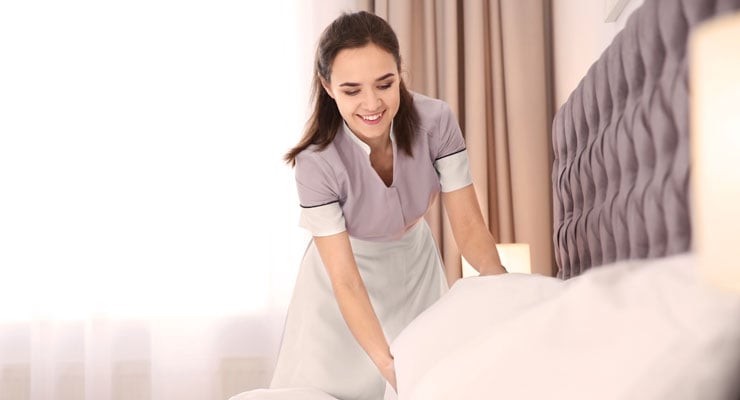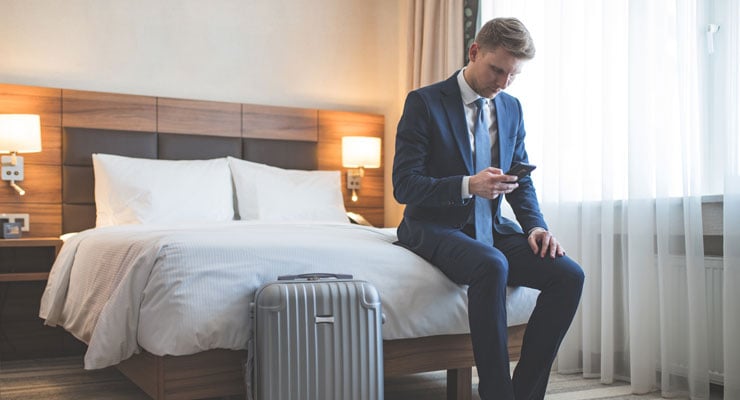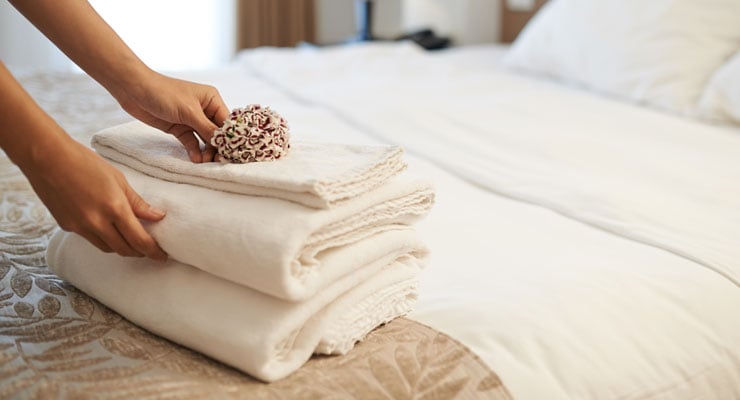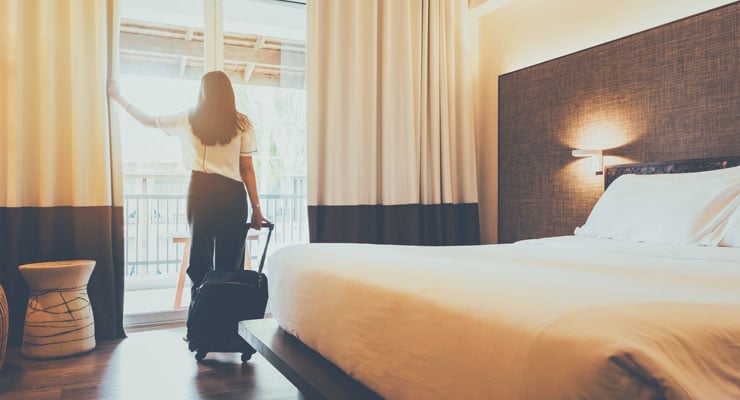 Written by: Joe Emerson // Feb 6, 2020
Written by: Joe Emerson // Feb 6, 2020
Last updated: Jan 17, 2023
Something guaranteed to give hoteliers a heebie and several jeebies is seeing their brand featured in a horror story under a headline such as “Confessions of a Hotel Housekeeper.” First there’s the pride factor. No one wants to be tied to a brand name that cues bedbug stories, tales of stomach-churning filth, or customer service failures; then there’s the bottom line. Study after study finds cleanliness concerns at the top of the list of guest-identified issues that can sour them on a hotel brand. With that in mind, we’ve turned to insiders in our search for housekeeping secrets for a cleaner hotel and repeat guests.
Address Problems Before They Generate Costly Complaints
Lodging, an online publication of the American Hotel & Lodging Association (AHLA), says there are three things hoteliers must know to meet guest expectations:
- Cleanliness is the top concern of most guests. AHLA cites data showing that “71 percent of guests want ‘above average’ cleanliness ratings in order to book a hotel.”
- Guest standards on cleanliness are higher than ever. The association notes that 10 percent of guests “report that their rooms don’t meet their cleanliness standards.”
- Get it right or get called out: AHLA notes that 97.7 percent of guests read online reviews before booking, and 90 percent of them will avoid the “dirty” ones.
A disgruntled guest equals a bad review, and getting called out online cuts into revenue. Lodging stresses a Convergys Corp. finding that one bad online review can cost your hotel more than 30 bookings.
The same study says a 1 percent improvement in your online reputation translates to a 1.42 percent boost in revenue per available room, and “lifting your online rating by a full star drives an 11.2 percent increase in average daily rate.”
Monitor Room/Amenity Conditions and Customer Reactions
If you believe the data, cleanliness and comfort are a hotel’s biggest draws. It follows that if you offer good accommodations and amenities and your housekeeping crew delivers on services, five stars could be rising on your horizon, especially if hotel managers:
- Ensure the online presence makes a visual promise of cleanliness. Airing your cleaning policies can only help.
- Don’t limit stringent cleaning practices to guest rooms. Every hallway, gathering space, and parking area should be pristine and welcoming.
- Make sure the cleaning process isn’t invasive. That means buying quiet vacuums and being respectful of guests’ privacy and belongings.
As for management practices, make sure they are the best for your brand. The Booking Factory, a website linked to a hotel management system of the same name, shares five housekeeping practices designed to generate repeat visits:
- Make training an integral part of housekeeping jobs, beginning with orientation for new employees.
- Provide the resources needed to do the jobs at hand and make checklists an integral part of the routine.
- Get in the trenches with the housekeeping crew to ensure the work is being done to specifications.
- Make sure every staff member knows they are an indispensable asset. Showing appreciation can reduce housekeeper turnover, which typically is the highest in the hotel game.
- Use the best available tools, from quiet vacuums and environmentally friendly cleaning supplies to apps and platforms that help you and the staff keep track of what’s being done.
Impressing guests with good housekeeping is goal No. 1, but there’s an additional incentive. Consider, for instance, Amadeus Hospitality’s claim that its cloud-based HotSOS Housekeeping system can save you an average of “$166 per guestroom by prioritizing the process of guestroom cleaning, digitizing the guest room inspection process and mobilizing the management of the department virtually.”
You don’t have to limit your quality control to monitoring rooms and social media. Leave the traditional survey card in the rooms, ask at checkout about a guest’s stay, and heed the responses.
There’s still nothing like an official survey to generate guiding data. Just choose the scale: from surveys done by services such as Customer Thermometer Ltd. to a self-generated version based on a template from the likes of SurveyMonkey.
Apply Big-Picture Solutions
FCS Housekeeping Operations Management has some advice on big-picture visions for management that allegedly delivers stellar housekeeping results. FCS shares five best practices for housekeeping operations:
- Use “a platform that can offer an intuitive on-screen room matrix in real time.” Translation: Use what it takes to make real-time information on room conditions immediately available at all times.
- Go with full automation. For instance: “With instant alert notifications, housekeeping management can take advantage of an inspection matrix, for instance, and can always be sure of their ability to review the quality of completed staff tasks in a timely and efficient manner.”
- Position your resources smartly. FCS notes that an intuitive management platform that can forecast occupancy levels allows you to reprioritize tasks and shift resources accordingly.
- Maintain inventory. If you don’t have enough critical amenities (towels, for instance), you can’t meet guests’ needs.
- Communicate continually. That means being able to “maintain direct lines of communication between all staff members regardless of location.”
The online publication HotelBusiness goes a bit more granular on what it takes to deliver five-star housekeeping. It says guests care most about what they can smell (think freshly laundered towels and no reek of cleansers in bathrooms), what they can see (no rumpled bedding or worn furniture/carpets), and what they can’t see (germs and bedbugs).
Don’t Forget the Basics
Hotelier.com goes to the nitty-gritty of the cleaning process when offering cleaning advice:
- When possible, begin by opening windows/airing out the room.
- Start by clearing out the trash, dirty linens – all the clutter.
- Begin the grittier cleaning with the bedroom areas, which avoids the transfer of bacteria from areas such as the bathroom to the sleeping area.
- Give cleansers used in bathrooms or elsewhere time to “work” before wiping or mopping. Using the cleansers’ muscle means you’ll need less of your own.
- Before mopping, do your sweeping/vacuuming. It makes mopping easier.
- Hit the nooks and crannies, even if it takes a toothbrush.
- Use a well-supplied and carefully organized cleaning cart.
- Dust everything, even light bulbs, and shake or vacuum the curtains.
- Vacuum the furniture, too.
Not enough detail? Check out Cleantec Innovation’s instructions on how to clean a hotel room in under 30 minutes, from “knock” to “finish.” Or get some green ideas from a Florida agency, the Southwest Florida Water Management District, which compiled a lengthy housekeeping primer for its Water Conservation Hotel And Motel Program. That primer includes 35-step instructions on cleaning a room.
Interested in Advancing in or Entering the Hospitality Field?
USF’s Center for Training and Professional Education (CTPE) is doing cutting-edge work in the hospitality industry. For instance:
- USF St. Petersburg’s Bishop Center offers an accelerated online Hospitality Leadership Program. The program “is designed to support a range of businesses, including restaurants, resorts, salons, law firms and the cruise ship industry – essentially any business where hospitality is at the center of success and where leadership matters.”
- USF Sarasota-Manatee has a Culinary Innovation Lab that serves as a teaching center for students in the Hospitality Management Program.
CTPE offerings also include programs in process improvement, project management, human resources, test preparation, and more. All of it relevant for people interested in becoming a hotelier or advancing in the field.






